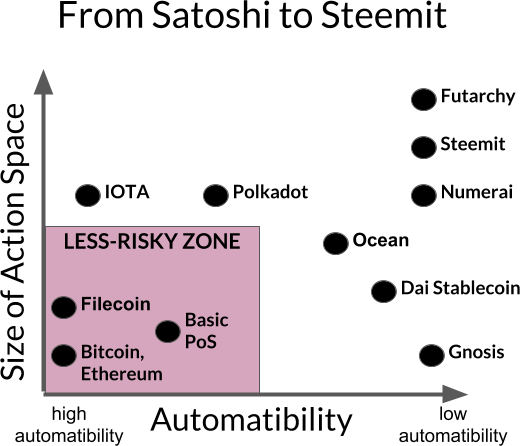If we keep pretending that token-based governance is a thing, we& #39;ll just keep designing dysfunctional systems that only serve as fodder for speculators. If you want to design tokenized systems that thrive, study how real-world companies work: they rely on strong executive bodies.
Just to add: my point is not that real-world companies or state democracies have great governance. My point is that even in these big important systems, the "token holders" have little interest to participate beyond voting once every few years -- so surely your rinkydink DAO...
shouldn& #39;t expect thousands of tiny token holders to make executive decisions. As @CemFDagdelen points out, corporate governance and state democracies are not the end of history. But the vector for improving them is not the vanilla "more direct democracy" https://twitter.com/CemFDagdelen/status/1315973434996916224">https://twitter.com/CemFDagde...
Direct Democracy pretty much does work as-is. For many reasons, but primarily because of the paradox of voting: small stakeholders are not incentivized to put in the work to make good decisions. token-based governance has offered few ways to solve this.
Also, to be clear, there are some promising suggestions for token-based governance that goes beyond the "direct token-based voting" paradigm. E.g. @joincolony @DemocracyEarth @daostack @AragonProject and others. But most projects are naive...
I see way too many projects and whitepapers and discussions that just assume as an axiom that vanilla token-based voting is a decent solution for governance. Instead, they should say "this is a hard problem, we& #39;ll use best-of-class solutions as they develop".
Another point: you can try to design DAOs that don& #39;t have empowered executive bodies, but do have sophisticated voting systems that try to solve the paradox of voting. (cf. Liquid Democracy or Holographic Consensus.)
I claim this is insufficient and that executives are necessary:
I claim this is insufficient and that executives are necessary:
Executives of a body can negotiate. They can set long-term plans and then adapt them on the fly. They are empowered to represent the organization. And they have this power in a legally-binding way:
Politicians sign peace treaties before bringing them to congress.
Politicians sign peace treaties before bringing them to congress.
CEOs make offers to buy and sell companies, before bringing them to the board or shareholders (if at all).
Executives wield dramatic power. They can be reprimanded for their actions -- but only after the fact.
Empowered executives of this sort are necessary for organizations:
Executives wield dramatic power. They can be reprimanded for their actions -- but only after the fact.
Empowered executives of this sort are necessary for organizations:
If your DAO only makes decisions by voting-based governance, and if potential decisions are only "brought up for voting" rather than executed, then there are many modes of organizational action that are completely blocked to you:
Outsiders cannot negotiate with an organization that does not have empowered executives that are allowed to represent it and make decisions for it. Iterating on policies becomes impossible. It& #39;s like trying to run a country with a parliament without a government.
My rule of thumb: if your token governance design, or your DAO, does not have executives, i.e. people who can take binding actions first, and only be punished after the fact, then you& #39;ve designed a dysfunctional governance system.
One good example for a system with empowered executives is @joincolony , which is designed to allow people to make empowered binding decisions first, and then to later suffer the consequences if they angered the group. I wish this concept was more widely used.
Here& #39;s a really important caveat to my claims, by @VitalikButerin . He says that DAOs have many roles. Some DAOs are "wide DAOs" that have wide responsibilities. Some DAOs are "narrow DAOs", entrusted to manage one narrow system semi-automatically
>> https://twitter.com/VitalikButerin/status/1316292839307796480?s=20">https://twitter.com/VitalikBu...
>> https://twitter.com/VitalikButerin/status/1316292839307796480?s=20">https://twitter.com/VitalikBu...
He says that on narrow DAOs, you absolutely don& #39;t want empowered executives -- you want a stable and dependent organization, that just quietly does its job. Like the Bitcoin network, for example. He references the work of Thomas Sowell on this dichotomy. https://twitter.com/VitalikButerin/status/1316292846102605824">https://twitter.com/VitalikBu...
There& #39;s a big spectrum of DAOs& #39; missions, and they need very different designs. In fact, I already have a diagram for this, from my blog post on behavioral crypto-economics. The more you are on the top-left, the more you& #39;d want an empowered executive.
https://medium.com/lunar-ventures/behavioral-crypto-economics-6d8befbf2175">https://medium.com/lunar-ven...
https://medium.com/lunar-ventures/behavioral-crypto-economics-6d8befbf2175">https://medium.com/lunar-ven...
*top-right

 Read on Twitter
Read on Twitter


